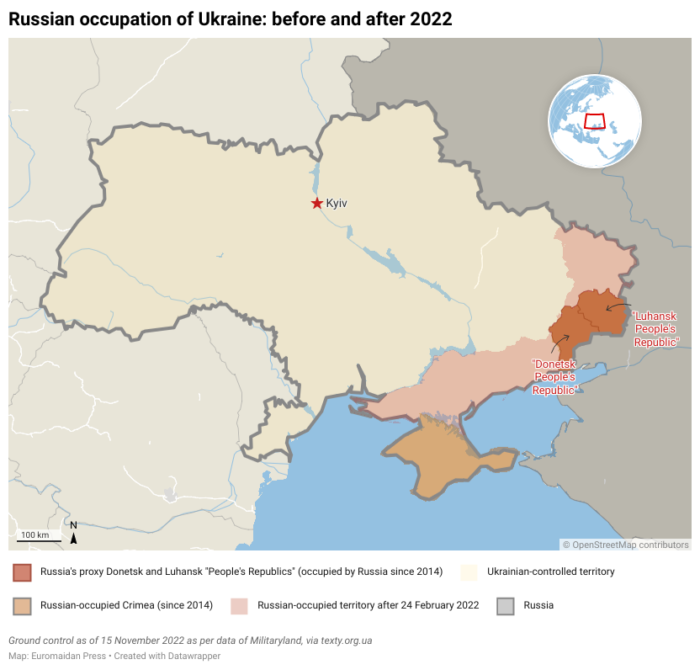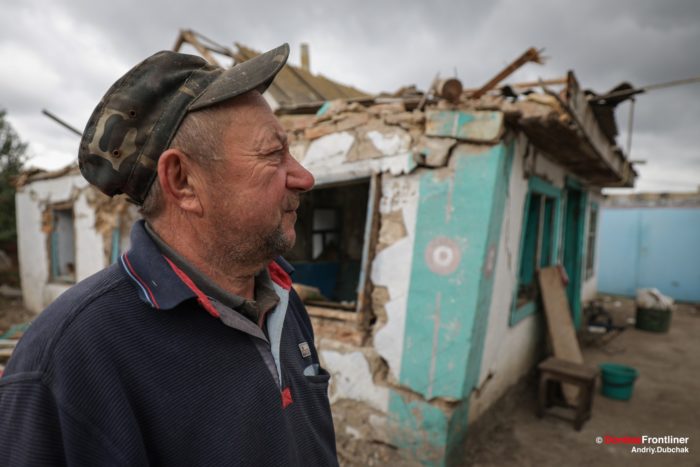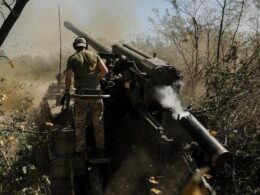In its 25 January decision, the European Court of Human Rights (ECHR) in Strasbourg ruled that east Ukraine's Donbas since 11 May 2014 was effectively controlled by Russia, and not separatists, as Russia claimed. Here are four things that this decision, hailed as a major victory by Ukrainian authorities, changes.
ECHR rules it has jurisdiction to hear complaint by The Netherlands and Ukraine
- The ECHR reviewed a collective case of Ukraine and the Netherlands (dubbed the "great Donbas trial") against Russia, accusing it of systematically violating human rights in eastern Ukraine's Donbas (in particular for the downing of flight MH17 in June 2014), or failing to investigate them -- see the events leading up to the case in our previous report;
- To make a decision in this case, the ECHR needed to answer a set of questions. Was this part of Donbas occupied? Does Russia control it? Which part of Ukraine does Russia control? Is Russia responsible for crimes committed in this part of Ukraine, and which ones exactly?
- It decided that it had jurisdiction to hear complaints against Russia for human rights violations in the territories of eastern Ukraine, as they were already de facto under Russian control.
- The merits of the case are yet to be heard, but the Ukrainian side considers the recognition by the European Court of its jurisdiction to hear this case against Russia to be its interim victory, as Russia had consistently insisted that the conflict in Donbas since 2014 was a "civil war" that it had nothing to do with.

1. Russia's occupation of Donbas since 2014 gets first recognition by an international court
The ECHR became the first international court to legally prove that Russia occupied part of Ukraine's Donbas since 2014, something that Russia consistently denied, insisting that the conflict in eastern Ukraine was of domestic origin. This gives Ukraine new, powerful political and legal support in its fight against the Russian invasion. The ECHR's decision, a 230-page-long document, contains six main elements:- recognizes Russia's armed aggression in Donbas.
- sets the start of Russian occupation of Donbas as 11 May 2014, the date of Russia's sham "referenda" that created the Luhansk and Donetsk "People's Republics" ("LNR" and "DNR" -- the court uses quotation marks around the abbreviations, signifying that it does not recognize Russia's proxies as real entities).
- defines territories where Russia is responsible for violations -- all the territory of the so-called "LNR" and "DNR" on the date of the "referendum," 11 May 2014. This means that Russia carries responsibility for all violations committed by separatist administrations and armed groups on the Ukrainian territory it occupied.
- allows proving Russia's guilt for shelling Ukrainian territories over the contact line, such as schools and civilian houses.
- confirms that Russia's violations were systemic and not isolated. These include murders and beatings to death of civilians and POWs, torture and rape, forced labor, kidnapping, illegal arrests, and long-term detention, attacks on religious grounds, persecution of journalists and blocking of Ukrainian broadcasts, destruction of private property, bans on education in Ukrainian, and persecution based on Ukrainian allegiance.
"even the admissibility of this case is a powerful political signal and legal confirmation that Russia is still responsible for everything that has happened in eastern Ukraine since 2014," Iryna Mudra, Ukraine's deputy Minister of Justice, told RFE/RL.
2. ECHR decision will pave the way for further international recognition of Russian occupation
It matters not that the ruling of the court will not be implemented. What matters is that the ECHR was the first international court to determine the limits of Russia's occupation of Donbas in space and time. This decision will be used by other international courts and bodies, as is usual for international law.This means that the international community and other international courts will now take it as a fact that Russia's occupation of eastern Ukraine, as well as armed aggression, began in the spring of 2014, and the "LNR" and "DNR" were under Moscow's control, European Pravda reports.
3. Ukrainian citizens and companies will be able to sue Russia for losses in eastern Ukraine
Recognizing that it is Russia that is legally responsible for the events in Donbas is important for those Ukrainian businesses that have lost their property. In particular, the de facto authorities of the so-called "DNR" and "LNR" expropriated the property and businesses of Ukrainian owners. Some of the property and equipment of Donbas plants were taken to Russia, while others were destroyed. Now the owners have a way to recover these losses from Russia by launching individual complaints to the ECHR. "This decision opens the way for investment arbitration," Iryna Mudra, Deputy Minister of Justice, explained. In addition, the decision on jurisdiction in the Donbas case unblocks the consideration of many complaints against Russia previously filed with the ECHR over the events in Donbas. Even though Russia was expelled from the Council of Europe after its full-scale invasion of Ukraine and announced that it will not comply with ECHR decisions after 15 March 2022, it remains responsible for human rights violations committed in the past. However, receiving compensation from Russia after the decision of the ECHR in practice is unrealistic, as Russia refuses to voluntarily comply with ECHR judgments. The only realistic hope for plaintiffs is to await the time when a compensation mechanism will be set in motion and damages will be repaid at the expense of confiscated Russian assets.4. Ukraine gets more impetus for setting in motion reparations mechanism
The ECHR decision will be instrumental for Ukraine to conduct negotiations with Russia when the time comes. As well, it will be instrumental in establishing a compensation mechanism that will help with "monetizing" not only decisions of the European Court and ECHR, but also judgments received by private investors in investment arbitrations over Crimea, as well as the judgment of the International Court of Justice, Iryna Mudra says. The compensation mechanism that Ukraine is proposing to its allies envisions a commission that will review appeals of private persons, companies, and the state of Ukraine in compensating damages from Russia's war that started on 24 February 2022, and a fund that will be replenished with confiscated Russian assets, money, gold, and foreign exchange reserves. Sooner or later, Russia will want to return to the civilized world and again become part of the financial system, enter transactions with other countries, and will need to deal with the judgments carried out against Russia. So, either Russia's leadership will willingly compensate for damages, or they will be monetized at the expense of confiscated Russian assets. This is why it is very important to gather evidence of Russia's evidence, Iryna Mudra says. According to her, currently, Ukraine is negotiating with partners to implement the UNGA resolution from 14 November 2022, which called for Russia's reparations to Ukraine. Particularly, it is setting up an international register of losses that will gather data and proof of losses caused by Russia to Ukraine, after the launch of which (tentatively, in May) the compensation commission will start functioning.Why the ECHR case against Russia is so important for Ukraine
Related:
- Why the ECHR case against Russia is so important for Ukraine
- UN General Assembly calls for Russia’s reparations to Ukraine





